|
Thread Number: 46793
Would you wash at 20? |
[Down to Last] |

|
| Post# 681546 , Reply# 2 5/29/2013 at 15:07 (3,978 days old) by washerlover24 () | ||
|
NO WAY!!! i will never wash below 40* i just feel things are not clean enough. | ||
| Post# 681556 , Reply# 3 5/29/2013 at 15:56 (3,978 days old) by AquaCycle (West Yorkshire, UK) | ||
 | ||
| Post# 681559 , Reply# 4 5/29/2013 at 16:36 (3,978 days old) by pierreandreply4 (St-Bruno de montarville (province of quebec) canada) | ||
 | ||
Post# 681561 , Reply# 5 5/29/2013 at 16:41 (3,978 days old) by ozzie908  (Lincoln UK) (Lincoln UK) |
||
An emphatic ..... | ||
| Post# 681569 , Reply# 8 5/29/2013 at 17:46 (3,978 days old) by AquaCycle (West Yorkshire, UK) | ||
more energy efficiant to wash in cold water | ||
| Post# 681583 , Reply# 9 5/29/2013 at 20:17 (3,978 days old) by pierreandreply4 (St-Bruno de montarville (province of quebec) canada) | ||
aquacycle
maybe thats how things are in your family but for me when i learn doing the wash load on my old inglis superb vintage washer ilearn to do it washing in cold water and also time are changing and so do washing machines eather they are of american canadien design or european uk design we are going on a path where energy effency and global warming reduction. And also washing machines are constently changing every year, and for your info i have been washing in cold water and my clothes never smell bad and never did my washer and if you look closely at this care laundry guide you will see that most clothes must be wash in cold water to avoid damage to the fabric
CLICK HERE TO GO TO pierreandreply4's LINK 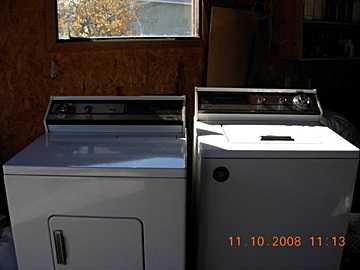
| ||
| Post# 681637 , Reply# 11 5/30/2013 at 02:08 (3,977 days old) by arbilab (Ft Worth TX (Ridglea)) | ||
 | ||
| Post# 681655 , Reply# 13 5/30/2013 at 07:13 (3,977 days old) by aeg03 (London, UK) | ||
|
No I wouldn't. I don't even like using the 30 degree temp setting so 40 degress in minnimum for me. | ||
| Post# 681683 , Reply# 15 5/30/2013 at 11:27 (3,977 days old) by hotpointfan (United Kingdom) | ||
No way!
Never below 40 even for delicates 40 or 30.
Most clothes I wash at 40 degrees eg darks. Some darks and mixed colours can go on 60 degrees if they are quite dirty. Whites are usually washed at 60 cotton or synthetics for shirts again at 60. Coloured towels at 60 degrees but white towels and tea towels at 90 degrees, we are slowly getting more and more white towels so we can phase out the coloured ones. I use Formil powder from Lidl occasionally and that claims to work at 20 degrees but I have never tried it and I don't intent to, anyway, my machine doesn't have one! Ariel advertises to wash at 15 but again I don't use Ariel Gel and I don't have 15 degrees and I wouldn't use it if I did anyway! | ||
| Post# 681692 , Reply# 16 5/30/2013 at 12:23 (3,977 days old) by DirectDriveDave () | ||
|
Our 1990 machine gives us 50 C (rounded off) for hot. I will NOT wash in water cooler than that for hot. | ||
Post# 681695 , Reply# 18 5/30/2013 at 12:44 (3,977 days old) by foraloysius  (Leeuwarden, Friesland, the Netherlands) (Leeuwarden, Friesland, the Netherlands) |
||

Factors in doing laundry are Time x Temperature x Mechanical Action x Chemical Action. If you decrease one factor, you will have to increase one or more of the other factors to get the same result.
So, in order to compensate for 20 degrees Celcius or Cold water washes, you will have to use longer wash times, more intensive wash action or/and more detergent. Where you will win on one end, you will loose at the other end. So there really is no point in washing at lower temperatures. More detergent, more wash action and longer wash times will cause more wear and tear on clothes than a higher temperature, as long as the temperature used is not too hot for the fabric. And indeed, everything that you wear on your body should survive a wash in warm water. | ||
| Post# 681733 , Reply# 19 5/30/2013 at 18:17 (3,977 days old) by pierreandreply4 (St-Bruno de montarville (province of quebec) canada) | ||
to all those that lives in the uk (*this is not a critic)
to all aw uk members what will you do if for any reason your country decided to adopt the same measures as the us or canada would you rather pay a fortune on sites like eb ay to try and buy a vintage washers that suits your needs me for one thing i have never had any trouble with washing in cold water i and never had bad smells or poor cleaning as everything came out perfecly clean and with the same amount of detergent and not add ons like color safe bleach ectonly 1/2 a cup of detergent and that its still the same today. Even if i have a duet and if i go back to a topload washer i will not change the way i wash the only time i would use warm water would be for perm press fabric or overnight soacking then cold water wash and the only time i would set my washer to hot water is for bedsheets otherwise it will always be cold water washing for me.
| ||
| Post# 681735 , Reply# 21 5/30/2013 at 18:46 (3,977 days old) by optima (Cumbria England) | ||
 | ||
Post# 681802 , Reply# 23 5/31/2013 at 08:03 (3,976 days old) by logixx  (Germany) (Germany) |
||

I think 600 watts is okay since this vacuum has no hose, which usually reduces air flow. Our Vorwerk has only 700 watts and a 100 watts power brush - cleans superbly. But it is true about the lowering of total power draw. Here, most large appliances are now only 10 amps, which means 2000 to 2500 watts of heating power. In the past, most appliances had 3000 watts at 16 amps. My washer, for example, claims a six kilo load to be washes at 40C on the one-hour cycle. Only recently did I find out that the heater isn't capable of heating the amount of water (at only 1900 watts) to the selected temp and the main wash will just time out. So bring back them powerful heating elements!
Back on topic. I'd only use 20C to refresh things that have been in the closet for too long and need a rinse, basically. I tried the Ariel gel and after two washings in 18C water, all my darks smelt and I had to rewash them in warm water. Coincidentally, our consumer magazine also reported about temps in washers and how hot each machine got on its 60C cycle. They said that, by the end of the year, only A+ efficiency machines are able to be sold. | ||
| Post# 681803 , Reply# 24 5/31/2013 at 08:11 (3,976 days old) by DJ-Gabriele () | ||
|
Here, most large appliances are now only 10 amps Go figure that the new Candy Grandò have a total connected power of only 1500W, talk about lowering instantaneous power use! | ||
| Post# 681811 , Reply# 25 5/31/2013 at 09:04 (3,976 days old) by gorenje (Slovenia) | ||
Sure it can be an individual choice, but ...
my answer is NO WAY!
Never below 40°C, simply because even the body temperature is almost 40°C. Any extra chemicals or extra time or extra vigorous action added to achive the same result will leads to higher costs, harm for the environment, harm for the clothes, than if a higher temperature is used. Regarding on washing habits in North and South America where a considerable percentage of people wash in cold I was wondering if it could be possible that the water chemistry over there is significantly different from ours here in Europe which is generally quite hard. It could be that washing a same load in cold over there or over here would lead to a different result, just because of the water. Mine is just a hypothesis. Ingemar | ||
| Post# 681812 , Reply# 26 5/31/2013 at 09:07 (3,976 days old) by MrLavadoro (Spain) | ||
|
Is stupid wash a 20 º I wash at 30, 40 or 60 degrees but NEVER i going to wash at 20 degrees it´s not higienical and is bad for the clothes. | ||
| Post# 681822 , Reply# 27 5/31/2013 at 11:43 (3,976 days old) by AquaCycle (West Yorkshire, UK) | ||
 | ||
| Post# 681856 , Reply# 30 5/31/2013 at 15:48 (3,976 days old) by Haxisfan (Europe - UK / Italy) | ||
If you wash at 30 then you might as well turn a blind eye on
Washing at 30 is unhygienic too... even washing at 40 is for that matter! The bottom line is... if you guys can put up with 30... why not 20? Besides, most modern detergents are designed to wash at such low temperature.
Having said that, I use the 20 degree program on the Hoover Dynamic 8-Pulse for some dark daily clothes (provided that they're not heavily soiled) that I used to wash at 30 degrees and the results are brilliant... or rather, they are exactly the same as when I was washing them at 30 in the other washer. I've done this for 6 months now and I'm still getting no bad smells or moulds neither in the washer or on the clothes. Actually I could say that in my older washer, if I washed too many loads at 30, I had to do a maintenance wash after 3-4 months cos' I could detect some unpleasant smell in the washer (nothing overpowering... I had to stick my head in the drum to smell it). The dynamic instead smells as fresh as ever! This machine on the 20 degree cycle uses a different mechanical action compared to other machines and it's wash performance on such program is comparable to a normal wash at 40 degrees C (laboratory tests proved it). Thus, my guess is that if they decide to include such cycle in other machines, they will make sure to alter its wash profile accordingly. Still, I keep washing my everyday lights at 40/50 and my towels at 60/70... sometimes I even boil-wash some bed linen. On a different note, I wouldn't use the 20 degree cycle continuously and for everything, I'm afraid but that could potentially be some users' unfortunate choice for the sake of saving some penny... and that could make some of your worst fears come true (I'm thinking of that watchdog episode, some time back on UK TV, when Ann Robinson was showing the horrifying state of some Indesit Moon washers swarming with thick black mould - having been used on quick 30 all their lives no doubt). | ||
| Post# 681957 , Reply# 34 6/1/2013 at 14:58 (3,975 days old) by mrb627 (Buford, GA) | ||
Would I wash at 20C? | ||
| Post# 681958 , Reply# 35 6/1/2013 at 15:15 (3,975 days old) by pierreandreply4 (St-Bruno de montarville (province of quebec) canada) | ||

this depends on the kind of fabric or shirt so in a way this can play on the chosen temp and do not forget that on some washer models its the selected was time that plays on the temp selection as there is no actual temp knob i know because in 2011 me and my whole family with my nieces we went to orlando florida i was the one doing the washer was a top load rebadge whirlpool roper washer straigh vane agitator and the wash temp was on the time knob there was a water level with extra large it look like this no hot water temp option but the warm water was more like cool water so a little piece of advice to aw members if you plan a vacation and rent a vacation villa make sure the washer in the rental is one that fits your needs or everyday wash use.
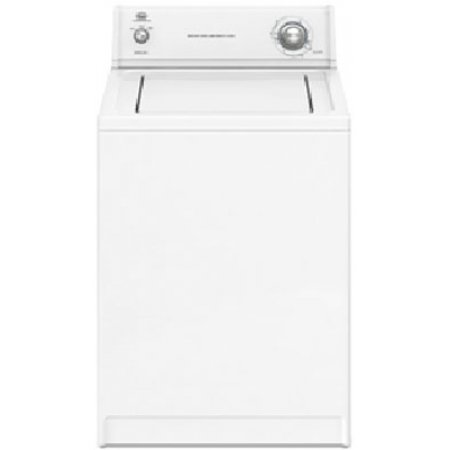
| ||
| Post# 682006 , Reply# 38 6/1/2013 at 19:25 (3,975 days old) by pierreandreply4 (St-Bruno de montarville (province of quebec) canada) | ||

it depends on the type of stain me other than paint stain when i wash i notice that in cold water the paint stain go away and i use resolve spray and wash first and also i think that also depends on the washer brand if you look closely at the picture i am posting these are one of the last few direct drive washer that offred a 4 wash rinse temp including the hot warm rinse option after that the hot warm rise option was remove from all direct drive top load washers see picture number 2 for other exemple for us and canadien members of aw who set the wash rinse temp to a hot warm rinse when they had that option and who think that the hot warm rinse temp should be on front load washers of today?
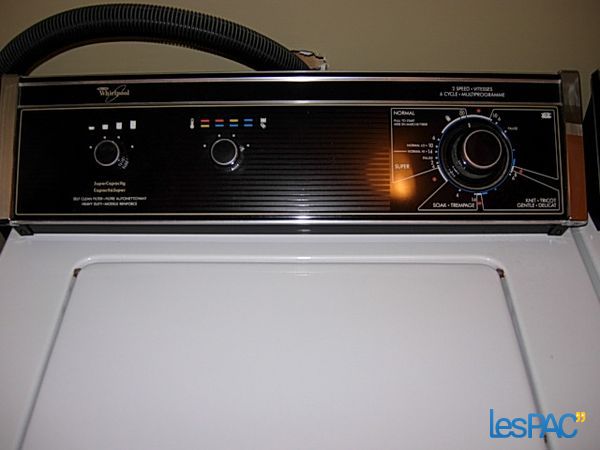
| ||
| Post# 682007 , Reply# 39 6/1/2013 at 19:28 (3,975 days old) by pierreandreply4 (St-Bruno de montarville (province of quebec) canada) | ||
picture number 2 | ||
| Post# 682012 , Reply# 41 6/1/2013 at 19:55 (3,975 days old) by ronhic (Canberra, Australia) | ||
It's as if Sydney people pretend that winter doesn't
It's not the cold per se, but the dampness that makes it feel cold in Sydney.
Sydney doesn't actually get 'cold' in the same way that it does in Canberra or Cooma for example. It is, however, a much more humid climate being at sea level and has a higher rain fall. And lets not go there about being seriously 'cold', like some parts of North America, Europe and Asia experience....however, as a Canberran, I never felt cold in Northern Germany in winter or when living in London for 3 years. A serious lack of insulation in Sydney homes (and in other places) is often the problem to their feeling cold as they become hard to heat....but it also allows the damp to invade when its wet too. Anyway, sorry about he segway. | ||
| Post# 682022 , Reply# 43 6/1/2013 at 21:33 (3,975 days old) by pierreandreply4 (St-Bruno de montarville (province of quebec) canada) | ||
washer 111 
i can tell you that on my old direct drive inglis superbII whirlpool topload washer i can tell you that cold water rinsing was poor i had to remove the suds fully to restart the washer on a full cycle just for adequate rinsing and suds removal from clothes i think what ever type of detergent or washer use that be a front load or top load there should always be a warm rinse option eather that option comes after the hot water wash for those that use that setting or warm water if you look on the pic i posted my family had that washer when i was a teen - the matching dryer
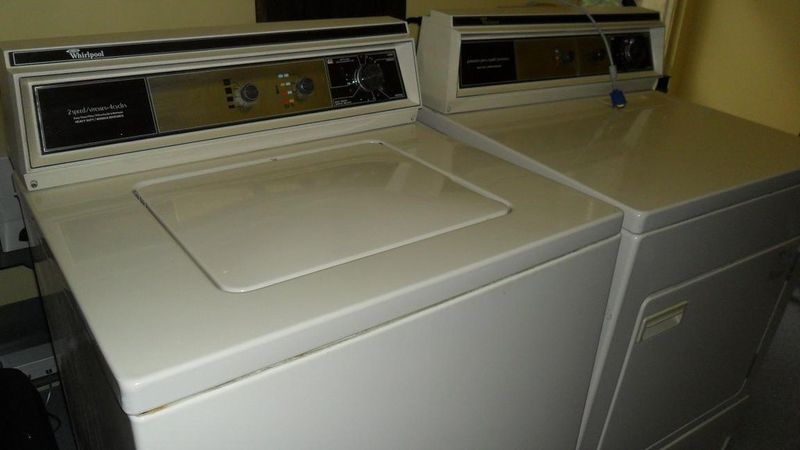
| ||
| Post# 682025 , Reply# 44 6/1/2013 at 21:41 (3,975 days old) by pierreandreply4 (St-Bruno de montarville (province of quebec) canada) | ||

the way i see this the way for european made machine or those that do not went there clothes wash if its a normal soil load not to dirty the dial should offer the option of having a cold 20 prewash option to wet the clothes then the dial or electronic board makes the washer heater kick in to heat the water to the selected temp for the main wash for my exemple i will say 40 warm for normal avrage soiled loads on the normal cycle 45 to 50 mid warm to hot for more soiled fabric in the mean time during the heating process the washer pause so the clothes kind of soak during the heating part with an ocasinal tumble of the drum to mix the suds to send them on the clothes depending on the brand of the washer of course
| ||
Post# 682063 , Reply# 47 6/2/2013 at 04:46 (3,974 days old) by mrboilwash  (Munich,Germany) (Munich,Germany) |
||

I`ve used the controlled cold on a recent vaccation in the States. Only had a small package of some nasty Sun powdered detergent on hand and did not want to chance any damage to my clothes from the caustics and perborates, so I tried the cold setting.
Even my socks looked amazingly clean and smelled fresh. But after just a few hours of wearing my shirts stank to high heavens. The shirts I came with (washed at 60°C) I could easily wear for 24 hours in the very same climate and they still smelled ok. Rinsing of the GE toploader I used was superb, as you get the full procedure of spray rinses plus a deep fill when 2nd rinse option is selected. So I don`t think poor rinsing was the reason. My conlusion is that cold water washing can work for some, but not for me because I only change my clothes once a day. If I had to cope with cold water only I could not possibly sleep in the same underwear I`ve worn all day long. | ||
| Post# 682216 , Reply# 50 6/3/2013 at 05:37 (3,973 days old) by dave886 (united kingdom) | ||
|
Machine drying would pretty much kill anything i wouldn't compromise my wash temperture just so the tumble dryer can kill germs, they should be killed in the wash cycle. Because low water level u need a long wash, i just don't see how you could get a full load clean at 20oC, they proberly smell like damp afterwards. | ||
Post# 682249 , Reply# 51 6/3/2013 at 11:15 (3,973 days old) by logixx  (Germany) (Germany) |
||
Tumble Dryers | ||
Post# 682263 , Reply# 52 6/3/2013 at 12:58 (3,973 days old) by foraloysius  (Leeuwarden, Friesland, the Netherlands) (Leeuwarden, Friesland, the Netherlands) |
||
 | ||
Post# 682352 , Reply# 55 6/4/2013 at 02:53 (3,972 days old) by foraloysius  (Leeuwarden, Friesland, the Netherlands) (Leeuwarden, Friesland, the Netherlands) |
||

I'm not exxagerating. To kill dustmites you need high temperatures for a long time. On Wikipedia it even says 10 minutes in a dryer on 105 degrees Celcius! The asthma nurse practioner told me that an hour on 60 degrees Celcius has about the same effect. While some dustmites will be killed on a shorter cycle, some will surely survive.
en.wikipedia.org/wiki/House_dust_... As for using fabric softener, I get short of breath from a lot of the fragrances in that stuff. Laundry needs to be really clean, when it's smelly it isn't. | ||
| Post# 682364 , Reply# 57 6/4/2013 at 06:35 (3,972 days old) by pierreandreply4 (St-Bruno de montarville (province of quebec) canada) | ||
bath mat
washer 111 i totaly agree with you once a month or when i notice a humidety smell in the bath carpet i wash those carpet in warm water if the humidety sent is not to strong but if it is i wash those in hot water and 1 once a week i wash bedsheets in hot water but if its just pillow case then i do not change the temp and i also fine that its sad that today because of the new energy settings that water temp are dumb down because some loads like bedding or bath math may require a warm rinse. So to any aw members knowing they have to change there washers for vintage toploads and for those that prefer front load make sure you chose a model with a warm rinse option
| ||
| Post# 682378 , Reply# 58 6/4/2013 at 09:27 (3,972 days old) by lavamat_jon (UK) | ||
|
Pierre - so you do use hot water?? | ||
| Post# 682379 , Reply# 59 6/4/2013 at 09:46 (3,972 days old) by pierreandreply4 (St-Bruno de montarville (province of quebec) canada) | ||

yes but not for all items of clothes i use hot water for bedsheets no bleach of course bath maths but the max i use most of the time is warm water but my washer is a model with no water heater so when the washer starts to fill the water may enter cool as the hot water must go up true the pipes to the second floor where my washer is
| ||
| Post# 682382 , Reply# 60 6/4/2013 at 10:51 (3,972 days old) by aquarius8000 () | ||
|
Wash at 20? I don't wash stuff colder than 50*C excluding woolens/silks... It's just horrible, all my family have mouldy washers and they wash at 60 occasionally, tho at 20*C..... | ||
| Post# 682383 , Reply# 61 6/4/2013 at 10:53 (3,972 days old) by dave886 (united kingdom) | ||
|
@foraloysius SORRY TO HEAR THAT YOU SUFFER FROM SHORTNESS OF BREATH. ITS NOT A NICE THING AT ALL TO SUFFER FROM SOMETHING LIKE THAT PS I KNOW IM WRITING CAPS. | ||
Post# 682402 , Reply# 62 6/4/2013 at 14:00 (3,972 days old) by foraloysius  (Leeuwarden, Friesland, the Netherlands) (Leeuwarden, Friesland, the Netherlands) |
||
 | ||
Post# 682406 , Reply# 63 6/4/2013 at 14:21 (3,972 days old) by Launderess  (Quiet Please, There´s a Lady on Stage) (Quiet Please, There´s a Lady on Stage) |
||
Would you wash at 20? | ||
Post# 682412 , Reply# 64 6/4/2013 at 16:07 (3,972 days old) by logixx  (Germany) (Germany) |
||
 | ||
| Post# 682413 , Reply# 65 6/4/2013 at 16:25 (3,972 days old) by pierreandreply4 (St-Bruno de montarville (province of quebec) canada) | ||

there is nothing wrong in washing in cold water but this means cleaning the washer with something like afresh or tide cleaner or any strong cleaner after word as i have notice that if i was a normal light soil load with the cold option setting tends to leave my washer with a mild smellof humedety and i usaly clean my washer on a full cycle with afresh or tide cleaner once every 3 months look closely at the following picture what is the mistake in this pic the answer is pretty easy no warm rinse witch also means that this washer as no water heater me if i have the choice even if i prefer a topload washer but had no choice in buying a front load washer in case one day in case of reno done in the bathroom where the washer dryer is is stack i would look for a washer with a warm rinse in case i need a warm rinse for certain things that i have wash
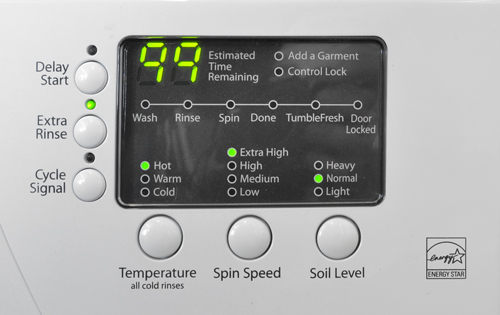
| ||
Post# 682430 , Reply# 66 6/4/2013 at 18:13 (3,972 days old) by rapunzel  (Sydney) (Sydney) |
||
|
"You just add a biocide" Yup, a small amount of chloroxylenol does the trick and very effectively. I use it in laundromat machines. About 30 ml (approx. 1 fl oz) in the deep rinse works really well. | ||
| Post# 682434 , Reply# 67 6/4/2013 at 18:39 (3,972 days old) by mickeyd (Hamburg NY) | ||
Once read
that it is the detergent which kills bacteria when they eat it in the water, suggesting that cold water is okay. I don't know if that is absolute fact or not. Think of washing your hands. On the other hand, it is always insisted that dust mites in bedding need really hot water to die. I guess it's all up to what kind of micro life you're trying to kill. Then again, sunshine can kill all manner of nasties, even rust stains. Hanging laundry in the sun works wonders.
Once while camping, we washed our clothes in a cold stream, and I was struck by the brightness of the colors as the clothing swirled in the stream. I use the whole arsenal of temps, sometimes even turning the tank up to HIGH, and sometimes even rinsing in hot water. In winter, however, our cold tap water is very cold, well below 20 C. and it works well on colors, and many here have been using it for years on certain loads. So by default, the answer is yes. Honestly, for me, water temps are more a function of mood and whim, but if I really want to kill, I use scalding water and Clorox, and, Man, do those mean little bugs scream. | ||
Post# 682443 , Reply# 69 6/4/2013 at 19:21 (3,972 days old) by Launderess  (Quiet Please, There´s a Lady on Stage) (Quiet Please, There´s a Lady on Stage) |
||
Persil Hygiene Spüler
Is all right for what it tis, and one uses it now and then (nabbed a stash from Germany), but the recommended amount (90ml) means one bottle won't last long. Plus the whiff packs quite a punch even after washing is machine dried.
There are many variations of biocide, bacteriostatic, fungicide, etc... final rinse additives sold to commercial laundries. If one wishes you can see those out here in the states but you may have to purchase a job lot. These products do the same thing as Persil's hygiene spuler, Sagrotan, Dettol and so forth... added to the final rinse provide an extra measure of sanitation and fungal control to washing. Same as with rinse additives available for commercial dishwashers used in restaurants and such when "low temp" washing has been carried out. Other alternative is to add either LCB or phenol (old formula Lysol) to a wash load done in cooler water temps as both will kill germs and such even in cold water. | ||
| Post# 682500 , Reply# 70 6/5/2013 at 02:27 (3,971 days old) by dave886 (united kingdom) | ||
|
Persil Hygiene @Launderess, i'm sure the persil in germany is better than the one in england | ||
Post# 682506 , Reply# 71 6/5/2013 at 03:56 (3,971 days old) by mrboilwash  (Munich,Germany) (Munich,Germany) |
||

IIRC there was a study about European washing habits posted here on AW a while ago.
There wasn`t that much of a difference hygiene wise when 30°C and 40°C were compared. Even at 60°C with a bleach containing powder used did not give stellar results in germ counts. Maybe they used one of those modern machines where 60°C is actually only about 50°C to get the A+ rating, I don`t know. | ||
| Post# 682509 , Reply# 72 6/5/2013 at 04:09 (3,971 days old) by dave886 (united kingdom) | ||
|
on my samsung, 60oc cotton with intensive option selected, 4 rines cycles, takes 4hrs and 25mins :( thats is just crazy, is there reason why it would be so long, does it have anything to do with killing bacteria. with out the intensive option, the time will vary depending on the load sensing | ||
Post# 682538 , Reply# 73 6/5/2013 at 07:36 (3,971 days old) by ovrphil  (N.Atlanta / Georgia ) (N.Atlanta / Georgia ) |
||
To be or not to be 20C
Interesting thread with a maze of ideas...to answer the questions..
1) Yes, sometimes but who knows a real-time water temp reading? We don't have a digital wondermachine; only three selections of cold, warm, and hot with cold rinses. But, yes ..we wash cold if the fabric tags specify cold temp wash. Example : I have a WASHABLE wool fabric sweater, that requires cold and delicate (or hand-wash)cycles. 2)...no, the cost is insignificant 3)Low-water useage and washers with mandated temperature requirements = big brother is "washing" YOU. | ||
| Post# 682872 , Reply# 75 6/7/2013 at 04:45 (3,969 days old) by glenfieldmathk1 (Glenfield-Leicester-UK) | ||
|
20C is about 68F (according to Google) 30C is about 86F 15C is water that usually comes out of the average household tap (not sure if thats the same as the US) 59F. The average UK household washes at 40C (104F) - Your machines call this Warm/Cool? | ||
Post# 683188 , Reply# 78 6/9/2013 at 08:10 (3,967 days old) by wilkinsservis  (Melbourne Australia) (Melbourne Australia) |
||
dont tell mum and dad they should be dead!
Since my mother bought the first automatic washing machine in 1970 she has washed almost exclusively in cold water. If one was to listen to the doomsayers and scaremongers on this site they should be dead....cold stone dead...rotting six feet under from fulminant multiple infectious diseases. They are however very much alive at 85 years old. At very least it would have been predicted that they would live as hermits because no one would come near them due to overwhelming issues with body odour but my mother's "candle lit suppers" make her the toast of the bridge club. I really dont see what the fuss is all about. Could some one please provide some scientific evidence to support or dispute the assertions in this thread?
| ||
| Post# 683302 , Reply# 81 6/9/2013 at 21:26 (3,967 days old) by ronhic (Canberra, Australia) | ||
Last Choice test
I've reproduced the test results for OMO Ultimate front loader detergent below. This was done earlier this year and shows the difference with identical test loads done in the same machine, but with one as a warm and one as a 'cold' wash.
Warm water IS more effective at removing every stain they test. Choice states: 'Dirt - Using a spectrophotometer, which measures how much light reflects off the swatches after filtering out any effects of optical brighteners, they measure how much dirt is removed. These readings are more accurate than the human eye – differences of about 6% are noticeable.' It'd be interesting to see the results for 60c. Tested in: Front loader Warm (40c) Cold (20c) Overall score(%) 81 76 General soil removal (%)87 81 Natural oils (%) 66 63 Rice Starch (%) 81 77 Vegetable oil (%) 88 86 Grass (%) 79 75 Motor oil (%) 66 61 | ||
| Post# 683344 , Reply# 83 6/10/2013 at 09:04 (3,966 days old) by dj-gabriele () | ||
|
It'd be interesting to see the results for 60c. I'd love to! :) | ||
Post# 683351 , Reply# 84 6/10/2013 at 10:33 (3,966 days old) by mrboilwash  (Munich,Germany) (Munich,Germany) |
||
 Could someone please provide scientific evidence to support or dispute the assertions in this thread?
Here you go! Could not find the original thread anymore, but finally found the study on the net. CLICK HERE TO GO TO mrboilwash's LINK | ||
| Post# 683457 , Reply# 85 6/10/2013 at 22:11 (3,966 days old) by ronhic (Canberra, Australia) | ||
Olav Differences of 6% can be seen with the eye, not just with the tool used. I'm not suggesting that many people are not happy with the results they get from cold water washing or implying they are 'dirty' or otherwise. But, if I can see the difference in performance without need of special tools and based on a single wash, then I would suggest that after repeated wear/wash/wear/wash etc, there will be a noticable difference on how items would look. In isolation, they would probably appear fine. However, when placed side by side, I'd suggest you would easily pick the one that isn't actually as clean as the other. | ||
Post# 683476 , Reply# 88 6/11/2013 at 01:34 (3,965 days old) by rapunzel  (Sydney) (Sydney) |
||
|
"cold water in summer is at 35°C " That's not what the research states. | ||
Post# 683552 , Reply# 90 6/11/2013 at 16:21 (3,965 days old) by DADoES  (TX, U.S. of A.) (TX, U.S. of A.) |
||
|
| ||
Post# 683559 , Reply# 91 6/11/2013 at 17:42 (3,965 days old) by rapunzel  (Sydney) (Sydney) |
||
|
They are not my points henene. I've copied that info from the research papaer. The Spanish cold water wash temperature, referred to in the paper, is 15 degrees, not 35. | ||
Post# 683623 , Reply# 93 6/12/2013 at 03:17 (3,964 days old) by mrboilwash  (Munich,Germany) (Munich,Germany) |
||
This would sum it up better for me 
"Hygienic quality of washing at lower temperatures
The results show that the hygienic quality of the washing processes at low temperatures (i.e. 15°C and 30°C) leaves something to be desired. A small reduction of the Total Plate Count is achieved only in some cases. The contamination level after washing is still relatively high. A significant temperature effect on the hygienic quality is found (ANOVA-One Way, á = 0.05): from a hygienic point of view a 30°C washing process is better than a 15°C washing process. There is no effect of the bleaching agent on the hygienic quality. The hygienic properties of the detergents in the dosages used have the same level in the four European countries. No significant differences were found at 15°C and at 30°C." "A very general finding in this research is that in daily laundering, the cleaning properties expressed as washing efficiency are worse at lower temperatures. Lower temperatures mean lower hygiene levels. This is due to reduced germ elimination combined with increased cross-contamination." "The boil wash laundering process, which was used traditionally, showed appropriate cleaning properties combined with excellent hygiene efficacy. As mentioned in the previous sections, lower wash temperatures result in lower hygienic quality. Thus it may be assumed that for domestic textile laundering the measures to reduce energy consumption may have stressed the conditions for proper hygiene." But, as with any studys or statistics one is always free to pick out only the parts that suit oneself *LOL* I wonder if in Spain might be higher concentations of chlorine in the tab water as an explanation for the different results besides the high sudsing detergents and possible extra rinses. I also found it little surprising about liquid detergents` rinse efficiancy. We all know that liquids have a much lower pH when they contain enzymes than any heavy duty powder. So of course the risidual alkalinity test shows better results for the liquids... | ||
Post# 683654 , Reply# 95 6/12/2013 at 09:42 (3,964 days old) by rapunzel  (Sydney) (Sydney) |
||
|
Don't come the raw prawn with me... ...and then LOL me. If I picked out the parts that I liked best, what did you do? Just like you, I cut and pasted part of the report's summation without altering the words. It's there for everyone to read and draw their own conclusions. | ||
Post# 683658 , Reply# 96 6/12/2013 at 10:00 (3,964 days old) by mrboilwash  (Munich,Germany) (Munich,Germany) |
||
 | ||
| Post# 683680 , Reply# 98 6/12/2013 at 13:19 (3,964 days old) by pierreandreply4 (St-Bruno de montarville (province of quebec) canada) | ||
washers depending on where they are made are diffrent
rapunzel i have read the article seems that article dates from 2003 not all washers are made the same each brands are unique and if you look at us top load washer not all washers have an extra rinse option me in my case i had a set like this from 1993 to 2004 it was a direct drive washer and i did not have an extra rinse option and washing machines with years the model changes so in a way you might have what is top of the notch in your brand of washer for the current 2012 2013 years of production but that do not mean that next year the same washer you have same model will be its like the us canadiens washers if you look at the top load models of today the temp is dumb down like what was a true hot water before the changes in energy star qualification might be warm today warm water on today might be cool water and there auto cold with the possibilaty of hot water adding to disolve detergent and there tap cold for true cold water wash.
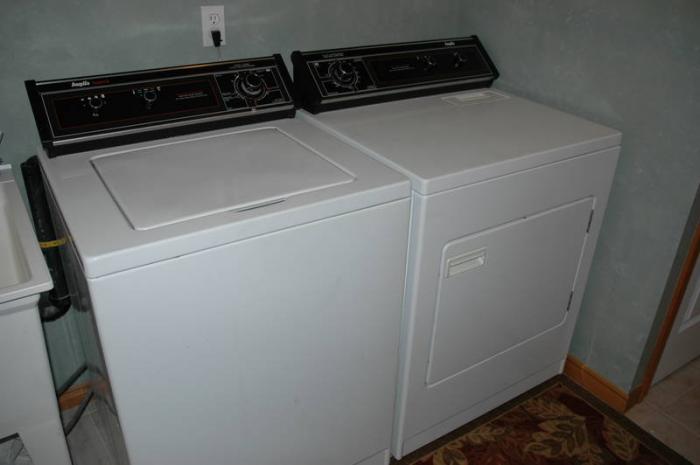
| ||
| Post# 683999 , Reply# 99 6/15/2013 at 14:59 (3,961 days old) by zanussi_lover (Nottingham, UK) | ||
I wouldn't | ||
Post# 684003 , Reply# 100 6/15/2013 at 15:28 (3,961 days old) by henene4  (Heidenheim a.d. Brenz (Germany)) (Heidenheim a.d. Brenz (Germany)) |
||
|
That's just how i do it. But, of course, 30° for some delicate stuff and wool. | ||
| Post# 684133 , Reply# 101 6/16/2013 at 20:28 (3,960 days old) by foxchapel () | ||
|
washing in 20c/68F . . . . . . I can just imagine what all the mothers who cloth diaper their babies would have to say about that. | ||
Post# 684148 , Reply# 102 6/17/2013 at 03:08 (3,959 days old) by ozzie908  (Lincoln UK) (Lincoln UK) |
||
washing in 20c/68F . . . . . . I can just imagine what all | ||
Post# 684149 , Reply# 103 6/17/2013 at 03:56 (3,959 days old) by chestermikeuk  (Rainhill *Home of the RailwayTrials* Merseyside,UK) (Rainhill *Home of the RailwayTrials* Merseyside,UK) |
||
Nappies
Lots of them, big business these days given the non eco disposable variety...they do reccommend washing @ 60d.....
60d and 40d for me with an occasional 90d CLICK HERE TO GO TO chestermikeuk's LINK | ||
Post# 684156 , Reply# 104 6/17/2013 at 04:54 (3,959 days old) by rapunzel  (Sydney) (Sydney) |
||
|
Non-disposable nappies Soak/prewash in tepid water and main wash in hot with oxygen bleach. Then into the dryer. No muss or fuss. | ||
Post# 684999 , Reply# 105 6/21/2013 at 22:42 (3,954 days old) by ozzie908  (Lincoln UK) (Lincoln UK) |
||
Another past blast !!
When I was a young Father of two back in the late 80,s we determined then it was cheaper to use the washer and dryer every other day than to buy disposable nappies, it also saved having to go down to the bins too often as we lived in a first floor flat, I believe it was washing those pesky critters that killed our beloved Servis Quartz...:o)
Austin | ||
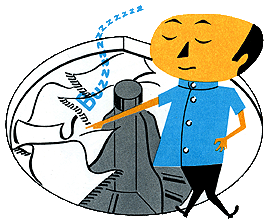
 Comes to the Rescue!
Comes to the Rescue!